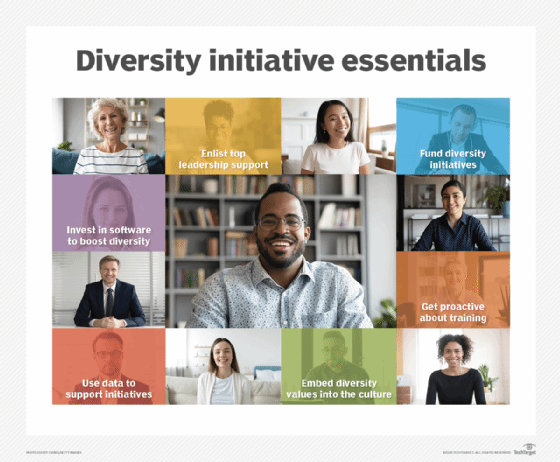
alotofpeople - stock.adobe.com
Diverse teams are smarter -- here’s why
Your company can foster an improved bottom line, better retention and a host of other benefits by supporting diverse and inclusive teams.
Investing in diversity is a smart business decision.
When organizations embrace diversity, creativity can blossom. Including more perspectives in decision-making can help uncover ways to broaden the organization's business strategy, reach target audiences, expand the workforce's skill set, and widen the candidate resource pool. In a nutshell, here are six ways diverse teams are smarter:
- They can improve the bottom line.
- They can solve retention and productivity issues.
- They can help solve the skills shortage.
- They can offer more accurate decision-making.
- They are more creative and innovative.
- They are better at problem-solving.
Here's a deeper dive on ways and reasons why diverse teams are smarter.
1. Improve the bottom line
Building and fostering diverse teams isn't just an exercise in corporate social responsibility -- doing so can directly impact the bottom line and deliver better business results.
Organizations that score in the top quartile of executive team gender and ethnic diversity are about 9% more likely to outperform their peers, according to McKinsey & Company's report "Diversity Matters Even More," which included 1,265 companies across 23 countries. In contrast, organizations that landed in the bottom quartile for those measures are about 66% less likely to outperform financially. In addition, companies in the top quartile whose boards were diverse in terms of gender and ethnicity were more likely to outperform financially than those in the bottom quartile by 27% and 13%, respectively.
That's just at the leadership level. Cascading diversity down through the entire organization can lead to even greater gains.
2. Solve retention and productivity issues
A diverse workforce is key to overcoming a company's productivity and retention struggles.
For example, workers in the 55-64 age range can help lower a company's overall turnover and can lift productivity, according to "Promoting an Age-Inclusive Workforce," published by the Organisation for Economic Co-operation and Development (OECD).
This will become increasingly important as the workforce becomes older.
More than 40% of people in advanced economies are likely to be older than 50 by 2050, according to the OECD report. This trend of an older workforce is increasing rapidly, as people retire later and fewer younger people enter the workforce.
3. Solve the skills shortage
Hiring from a diverse talent pool can help companies address the skills shortage. This can provide a broader range of capabilities and expertise that you can rely on, extending your resources and opening up new opportunities.
When a hiring team only considers a narrow pool of candidates with similar backgrounds and shared experiences, it can needlessly limit their search and result in a workforce with overlapping, and thus, redundant skills. An adaptable organization employs people with complementary skill sets.
Many types of skills exist, from hard skills and soft skills to categories ranging from customer service to IT administration, and beyond. Such skills are developed in different environments, different industries, and even different parts of the world. By considering candidates with unique backgrounds or who have experience outside the traditional education landscape, you can shift your focus to identifying those who have new perspectives and skills that can make your skills base more diverse.
Diversity can also help your organization be more culturally competent. When your team comprises people with different ethnicities, national origins, cultures, religions, etc., you can gain insight into what certain groups of people value and better navigate various situations, such as entering a new market or operating globally versus locally.
4. Offer more accurate decision-making
Working with people who are different from you might challenge your brain to sharpen its performance.
Scientists researched the effects of ethnically diverse and homogeneous markets on traders' ability to price stocks in a simulated market environment. Skilled traders placed in diverse teams were 58% more likely to price stocks correctly, while those in homogeneous groups were more prone to pricing errors, according to "Ethnic diversity deflates price bubbles," published in the Proceedings of the National Academy of Sciences journal.
Why is this the case?
For starters, more diverse teams are more likely to reexamine facts and remain objective, according to the study. Individuals in diverse teams might trust each other less -- they might not be as willing to accept other people's opinions and facts at face value. This can lead them to more closely scrutinize information and assumptions. While this process takes time, it can result in more accurate and more carefully considered decisions.
In a work environment, this can translate to keeping team members accountable and avoiding groupthink. Instead of making rash decisions based on assumptions, team members can spend more time considering the facts and possible outcomes, resulting in more accurate and sound decision-making.
5. Are more creative and innovative
Diverse teams are more likely to yield novel ideas more often. People with different experiences, ideas, and philosophies can help each other expand their sense of possibilities. While this process might be uncomfortable at first, including diversity supports new ideas and cultivates real innovation.
Deep-level differences in values, perspectives and cognitive frameworks possessed by people from different countries and ethnicities are positively related to both innovation and creativity, according to "Team creativity/innovation in culturally diverse teams: A meta‐analysis," published in the Journal of Organizational Behavior in February 2019.
Bringing together groups of people with different backgrounds and lived experiences, such as Black, indigenous, and people of color (BIPOC), people with disabilities and people with neurodivergence can support a break from conventional thinking.
Diverse and inclusive organizations are 70% more likely to capture new markets and are 75% more likely to see ideas turn into products, according to Korn Ferry research published in "The 5 disciplines of inclusive leaders."
6. Are better at problem-solving
Two heads are better than one is a common idiom for a reason. Human beings can accomplish amazing things individually, but by combining their powers, they can do even more incredible things at scale. However, two heads aren't necessarily better than one if the result is groupthink.
People of different races, cultures, genders, ages, sexual orientations and experiences bring cognitive diversity, which adds helpful perspectives, problem-solving abilities and ways of brainstorming, which can be critical in today's rapidly shifting demographic consumer landscape.
Indeed, cognitively diverse teams exhibit higher levels of problem-solving skills compared with high- intelligence teams, according to "Cognitive Diversity for Creativity and Inclusive Growth" published in German Chemical Society's journal Angewandte Chemie International Edition on Nov. 26, 2024. Moreover, companies with at least one woman on their board of directors have higher financial performance as compared with all-male boards.
These are just a few reasons why diverse teams are smarter. In practice, the benefits extend to specific types of teams, such as sales, marketing teams and tech teams. Building a diverse and inclusive workplace can make your organization more resilient, innovative and welcoming, ultimately creating a better environment for your team -- an environment that empowers them to do their best work.

Once leaders understand why diversity creates smarter teams, they can move on to supporting DEI strategies and researching the right tools. There are also specific ways of cultivating more diversity in tech teams, in particular.
Jacob Roundy is a freelance writer and editor specializing in a variety of technology topics, including data centers and sustainability.







